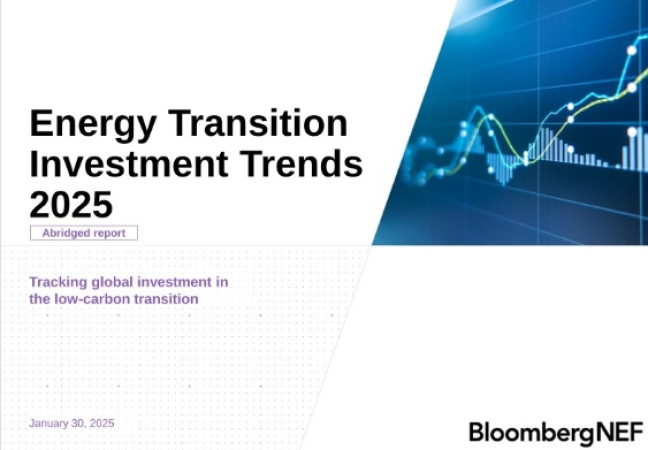
Follow India Renewable Energy News on WhatsApp for exclusive updates on clean energy news and insights
Global Energy Transition Investment Surpasses $2 Trillion in 2024: BloombergNEF
Feb 19, 2025
A recent report by BloombergNEF, "Energy Transition Investment Trends 2025," reveals that global investment in the low-carbon transition reached a record Rs18,270,000 Crores in 2024, marking an 11% increase year-on-year. This milestone underscores the growing financial commitment to clean energy but also highlights a two-speed transition, with significant gaps in funding for emerging technologies.
Key Findings
- Investment Growth Slows: While the Rs8,270,000 Crores investment marks a new high, the growth rate has slowed compared to previous years, signaling potential challenges in scaling up funding.
- Divergence in Technology Investments: Mature technologies such as renewables, electric vehicles (EVs), and power grids attracted the bulk of investments, while funding for emerging sectors like hydrogen and carbon capture & storage (CCS) declined. This gap highlights the need for stronger de-risking mechanisms to encourage investment in next-generation clean technologies.
- China Leads Investment Surge: Mainland China’s energy transition investments grew by 20%, accounting for nearly two-thirds of the global increase. In contrast, investment in the U.S. and the European Union stagnated or declined, raising concerns about regional disparities in energy transition efforts.
- Net-Zero Investment Gap: Despite record-breaking investment levels, funding remains far below the Rs48,880 crore per year required between 2025 and 2030 to meet global net-zero targets. This underscores the urgency of accelerating clean energy deployment.
- Resilient Clean Energy Supply Chains: Investments in clean energy supply chains exceeded expectations, despite concerns over manufacturing overcapacity in some sectors. This continued momentum is expected to lay the groundwork for future expansion.
- Decline in Climate-Tech Equity Investments: Venture capital funding for climate-tech startups fell by 40% in 2024, reflecting broader trends in equity markets. However, mergers and acquisitions (M&A) activity remained strong, suggesting sustained interest from major investors.
- Energy Transition Debt Surges: Debt financing played a crucial role, with $1 trillion in energy transition debt issued in 2024, driven largely by corporate bond sales.
Opportunities in the Energy Transition
- Emerging Technologies Hold Untapped Potential: Sectors like hydrogen and CCS remain critical for deep decarbonization and present strong opportunities for innovation and investment.
- Diversifying Supply Chains: The report highlights the potential to onshore manufacturing and supply chains outside of China, strengthening regional economies and energy security.
- Growing Sustainable Finance Market: The increasing availability of green bonds, sustainable debt, and equity financing offers crucial funding avenues for clean energy projects.
Challenges Ahead
- Scaling Up Investment: A dramatic increase in funding across all clean energy sectors, especially in emerging technologies, is necessary to align with net-zero pathways.
- Policy and Regulatory Support: Stronger government policies and risk-mitigation frameworks are essential to encourage private investment and accelerate clean technology deployment.
- Managing Overcapacity Risks: Addressing overcapacity in certain renewable energy manufacturing sectors will be key to sustaining long-term investment momentum.
As the world pushes toward a cleaner, low-carbon future, BloombergNEF’s findings emphasize the urgent need for increased financial commitments to bridge the investment gap and accelerate the global energy transition.